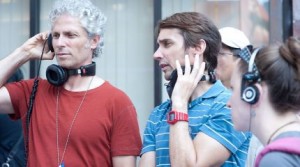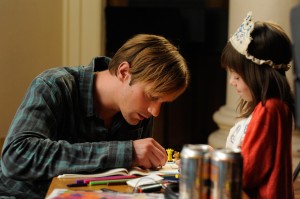Interview: Scott McGehee and David Siegel of “What Maisie Knew”
Posted on May 23, 2013 at 3:59 pm
“What Maisie Knew” is a touching, beautifully acted new movie starring Julianne Moore and Steve Coogan as a couple breaking up but the story is seen through the eyes of their little girl. I spoke to the directors, Scott McGehee and David Siegel, about the film. Remarkably, though it is set in the present day and feels very contemporary, it is based on a book written over 100 years ago by Henry James.
I have to begin my asking you, how you got that amazing performance out of Onata Aprile, who plays Maisie.
DS: With pins and…you know I’m just kidding. She really is extraordinary. We’d love to be able to take more credit for it then, then we really can because she really has this incredible ability to just live in front of the camera. To shut it all down and just give her a scenario and she could really just, just sort of be in it, to live it as I was saying. When we were casting, we knew we needed a child who could be, with her face and close up to be able to convey a sense that you were getting into her head, that there was an interior life there that you were sort of understanding on an emotional level. Then boy did she deliver in spades. The only time that we’ve ever had an actor in one of our films whose had that kind of responsibility was Tilda Swinton in “The Deep End, and you know, Tilda’s a forty year old actress, very trained and very cerebral. Onata is a six year old child who wants to play with her horsie.
SM: Our only handicap, honestly, was her bedtime.  We talked a lot about how to explain the story of the movie to her in a way she would understand. Her mother, Valentine Aprile, is an actress also, and really has a great relationship with her daughter. She kind of did the heavy lifting in terms of preparing Onata for the day’s work and, you know, kind of making sure she was comfortable with the emotional terrain of what the story was. And then the other actors also, Julianne Moore especially were all good about making sure Onata was comfortable if they were going to do a scene where they were screaming, or whatever. They’d say, “Okay Onata, I’m going to be screaming but I’m just pretending, and if you get uncomfortable let us know.” There was a scene I remember when Julianne had to cry and after she finished Onata was kind of giggling because she thought it was interesting that Julianne’s pretending went so far. She was very user friendly that way, if that makes sense.
We talked a lot about how to explain the story of the movie to her in a way she would understand. Her mother, Valentine Aprile, is an actress also, and really has a great relationship with her daughter. She kind of did the heavy lifting in terms of preparing Onata for the day’s work and, you know, kind of making sure she was comfortable with the emotional terrain of what the story was. And then the other actors also, Julianne Moore especially were all good about making sure Onata was comfortable if they were going to do a scene where they were screaming, or whatever. They’d say, “Okay Onata, I’m going to be screaming but I’m just pretending, and if you get uncomfortable let us know.” There was a scene I remember when Julianne had to cry and after she finished Onata was kind of giggling because she thought it was interesting that Julianne’s pretending went so far. She was very user friendly that way, if that makes sense.
The story seems so completely contemporary. Tell me a little bit about bringing it up to date.
 DS: You know it obviously starts with the writers, Nancy Doyne and Carroll Cartwright. There was a lightness of touch to the script that kept it from being maudlin. We were really afraid that there would be a kind of florid melodrama. Before reading the script that’s where our anxiety was. Their idea of telling the story in ellipses really also caught our eye from a film making perspective. That was really interesting and a great challenge. And it was also the thing that made it start to feel relevant and contemporary. It allowed us, the film makers, to play with it cinematically, to play with the fundamentals of film making, where the camera is, how high it is, what comes in and out of the frame and what she hears, what she doesn’t hear, because it’s all coming from her perspective. It’s a real treat to get to play with the blocks, as opposed to play with the digital blocks that are, you know, thicker, louder and you know, more violent. We had heard anecdotally or we read anecdotally that James was inspired to write this story because he had heard at a dinner party of a couple that had chosen in a divorce settlement to share custody of a child, and he thought it was the most ridiculous thing he’d ever heard. And so the book is kind of darkly satiric and it takes place over a much longer period of time in Maisie’s life. And now joint custody being the most common thing in the world. But still it is interesting how many people who see the film identify with the struggle that the child endured.
DS: You know it obviously starts with the writers, Nancy Doyne and Carroll Cartwright. There was a lightness of touch to the script that kept it from being maudlin. We were really afraid that there would be a kind of florid melodrama. Before reading the script that’s where our anxiety was. Their idea of telling the story in ellipses really also caught our eye from a film making perspective. That was really interesting and a great challenge. And it was also the thing that made it start to feel relevant and contemporary. It allowed us, the film makers, to play with it cinematically, to play with the fundamentals of film making, where the camera is, how high it is, what comes in and out of the frame and what she hears, what she doesn’t hear, because it’s all coming from her perspective. It’s a real treat to get to play with the blocks, as opposed to play with the digital blocks that are, you know, thicker, louder and you know, more violent. We had heard anecdotally or we read anecdotally that James was inspired to write this story because he had heard at a dinner party of a couple that had chosen in a divorce settlement to share custody of a child, and he thought it was the most ridiculous thing he’d ever heard. And so the book is kind of darkly satiric and it takes place over a much longer period of time in Maisie’s life. And now joint custody being the most common thing in the world. But still it is interesting how many people who see the film identify with the struggle that the child endured.
It’s a very different role for Julianne Moore. She plays a fading rock star.
SM: We took her to a Kills concert. The Kills’ frontwoman, Alison Mosshart, was kind of a style model for us for Julianne’s character. She said that the singing aspect of this character was the thing that scared her most. But it was also the thing that attracted her. She didn’t shy away from something new and challenging. She could, just kind of jump in head on, and it was really inspiring.
What did you want from the movie’s score?
DS: The composer was Nick Urata, who did the music for “Little Miss Sunshine.” He’s the front man for a band called DeVotchKa, so he’s a player himself. The score needed to kind of feel like Maisie’s world. There’s only occasionally any classical underscoring. Most of the scoring is kind of just, a kind of filling up of the kind of our world, with music. He really got on board with that, and thought it was a great idea and we, we got the idea early on in cutting that we thought a voice would be good. A voice would help connect us to the child.
The scene with Steve Coogan first asking and then un-asking Maisie to go to England with him is heart-wrenching.
DS: He was our first choice for that role and that doesn’t happen often enough. He’d handle the emotions really well, we thought, and he’d be a little bit funny at times and bring a bit of levity to the proceedings that we thought would be really welcome. And we just lucked out that his agent had read it around the same time and also thought of him for it. Steve’s a classically trained actor and really likes to do the dramatic stuff and doesn’t get that many opportunities. We were more than happy to give him one.
What was the most fun part of making the movie?
DS: We had such a good vibe on the set of this film. We have the lucky opportunity to work with several long time collaborators like Kelly McGehee, Scott’s sister, who’s been our Production Designer forever and Giles Nuttgens who shot and Stacey Battat, who did the costumes, and a lot of the seconds and thirds on the crew were great people. It was a pleasure to show up every day. And it doesn’t happen on every movie and, and you know you could just feel it. And we had a little six year old who just wanted to be there. She had so much enthusiasm and that never waned… Seven weeks, five days a week, a dozen hours a day. That was amazing.
